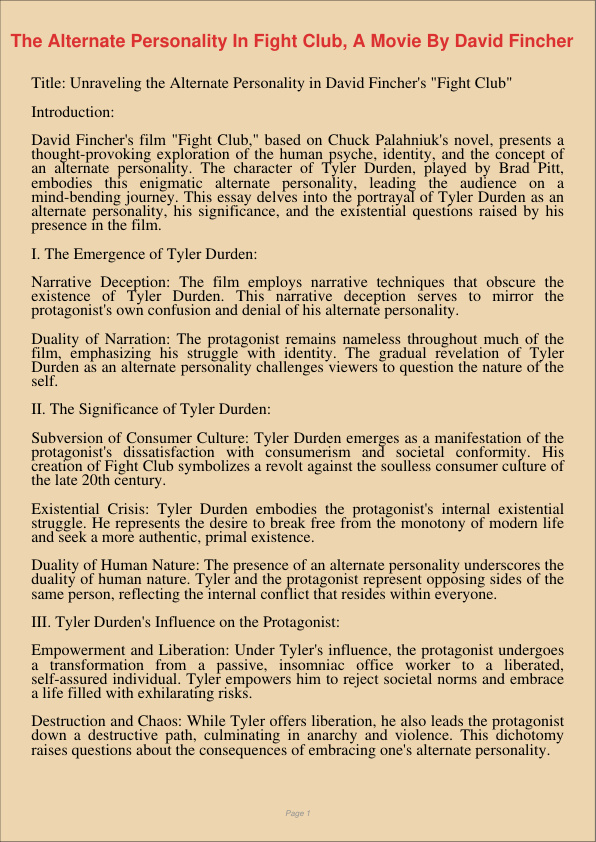Title: Unraveling the Alternate Personality in David Fincher’s “Fight Club”
Introduction:
David Fincher’s film “Fight Club,” based on Chuck Palahniuk’s novel, presents a thought-provoking exploration of the human psyche, identity, and the concept of an alternate personality. The character of Tyler Durden, played by Brad Pitt, embodies this enigmatic alternate personality, leading the audience on a mind-bending journey. This essay delves into the portrayal of Tyler Durden as an alternate personality, his significance, and the existential questions raised by his presence in the film.
I. The Emergence of Tyler Durden:
Narrative Deception: The film employs narrative techniques that obscure the existence of Tyler Durden. This narrative deception serves to mirror the protagonist’s own confusion and denial of his alternate personality.
Duality of Narration: The protagonist remains nameless throughout much of the film, emphasizing his struggle with identity. The gradual revelation of Tyler Durden as an alternate personality challenges viewers to question the nature of the self.
II. The Significance of Tyler Durden:
Subversion of Consumer Culture: Tyler Durden emerges as a manifestation of the protagonist’s dissatisfaction with consumerism and societal conformity. His creation of Fight Club symbolizes a revolt against the soulless consumer culture of the late 20th century.
Existential Crisis: Tyler Durden embodies the protagonist’s internal existential struggle. He represents the desire to break free from the monotony of modern life and seek a more authentic, primal existence.
Duality of Human Nature: The presence of an alternate personality underscores the duality of human nature. Tyler and the protagonist represent opposing sides of the same person, reflecting the internal conflict that resides within everyone.
III. Tyler Durden’s Influence on the Protagonist:
Empowerment and Liberation: Under Tyler’s influence, the protagonist undergoes a transformation from a passive, insomniac office worker to a liberated, self-assured individual. Tyler empowers him to reject societal norms and embrace a life filled with exhilarating risks.
Destruction and Chaos: While Tyler offers liberation, he also leads the protagonist down a destructive path, culminating in anarchy and violence. This dichotomy raises questions about the consequences of embracing one’s alternate personality.
IV. Questions of Reality and Perception:
Unreliable Narration: The film blurs the lines between reality and illusion, challenging the audience to question the authenticity of the events. This narrative ambiguity mirrors the protagonist’s own struggle to distinguish reality from delusion.
Philosophical Exploration: “Fight Club” delves into philosophical themes, such as nihilism and the search for meaning, as viewers grapple with the existential questions surrounding the protagonist’s dual personality.
Conclusion:
David Fincher’s “Fight Club” is a cinematic masterpiece that skillfully explores the concept of an alternate personality through the character of Tyler Durden. The film invites viewers to contemplate the nature of identity, the impact of societal conformity, and the internal struggle between order and chaos. Ultimately, the presence of Tyler Durden serves as a catalyst for existential introspection, challenging us to reevaluate the boundaries of reality and the complexities of the human psyche. It remains a compelling and thought-provoking cinematic experience that continues to spark discussions and debates on its underlying themes and messages.

「真诚赞赏,手留余香」
真诚赞赏,手留余香
使用微信扫描二维码完成支付
